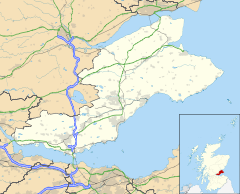Abercrombie, Fife
Abercrombie
| |
|---|---|
Location within Fife | |
| OS grid reference | NO517027 |
| Council area | |
| Lieutenancy area | |
| Country | Scotland |
| Sovereign state | United Kingdom |
| Police | Scotland |
| Fire | Scottish |
| Ambulance | Scottish |
| UK Parliament | |
| Scottish Parliament | |
Abercrombie (Gaelic: Obar Chrombaidh) is a village in Fife, Scotland.
Abercrombie, recorded in 1157-60 as Abercrumbin, means 'mouth of the river Crombie'. The first element is the Pictish word aber 'river mouth'. Crombie is a stream-name derived from the Gaelic word crombadh 'bending, winding'. This Gaelic stream-name probably replaced an earlier Pictish name.[1][2] The only stream near here entering the sea is the Inverie Burn, also known as St. Monan's Burn,[3] which discharges at St. Monan's. We might suppose that Crombadh was an earlier name for the burn.
Abercrombie is situated 1 mi (1.6 km) north of the village of St Monans, and 8.4 mi (13.5 km) miles south of the town of St Andrews. Abercrombie was the former name of the parish of St Monans,[4] although both Abercrombie and St Monans had churches.
The hamlet is centred on Abercrombie Farmstead, dating from 1892, which was built on the site of an earlier 13th century building.[4][5]
The land around Abercrombie was formerly owned by the Sandilands family and Sir James Sandilands was raised to the Peerage of Scotland as Lord Abercrombie in 1647. Lord Abercrombie wasted his estates following the death of his father and had to sell his properties in Fife in 1649. The title became extinct on the death of the second Lord Abercrombie in 1681.[6]56°13′02″N 2°46′38″W / 56.21722°N 2.77722°W
References
[edit]- ^ Grant, Alison (2010). Macleod, Iseabail (ed.). The Pocket Guide to Scottish Place-Names. Glasgow: Richard Drew Ltd. p. 23. ISBN 978-1-899471-00-3. OCLC 759569647.
- ^ "Pictish place-names as Scottish surnames: origins, dissemination and current status' (Nicolaisen, W.F.H.). Nomina. vol. 15. (1991-92), p 14. | quote= ‘Abercrombie was a barony and is now a village in Fife. There are medieval references to it in the twelfth century. While aber is Pictish, the specific element is a genitive -crombaidh of Gaelic crombadh 'bending'. The Gaelic adjective crom 'bent' from which it is derived may have replaced or 'translated' a Pictish word corresponding to Welsh crwm 'bent'.
- ^ North British Railway. West Highland Railway. Miller's Official Tourist Guide. 1904.
Passing St. Monan's, St. Monan's Birn, and Cardross Castle, on the right, the next station is Elie...
- ^ a b "Abercrombie, Fife". Gazetteer for Scotland. Retrieved 17 February 2018.
- ^ Munro, David M. (2006). Scotland : an encyclopedia of places & landscapes. Gittings, B. M. (Bruce M.), Royal Scottish Geographical Society. Glasgow: Collins. ISBN 9780004724669. OCLC 225152110.
- ^ "Abercrombie or Abercromby". www.electricscotland.com. Retrieved 10 April 2019.

